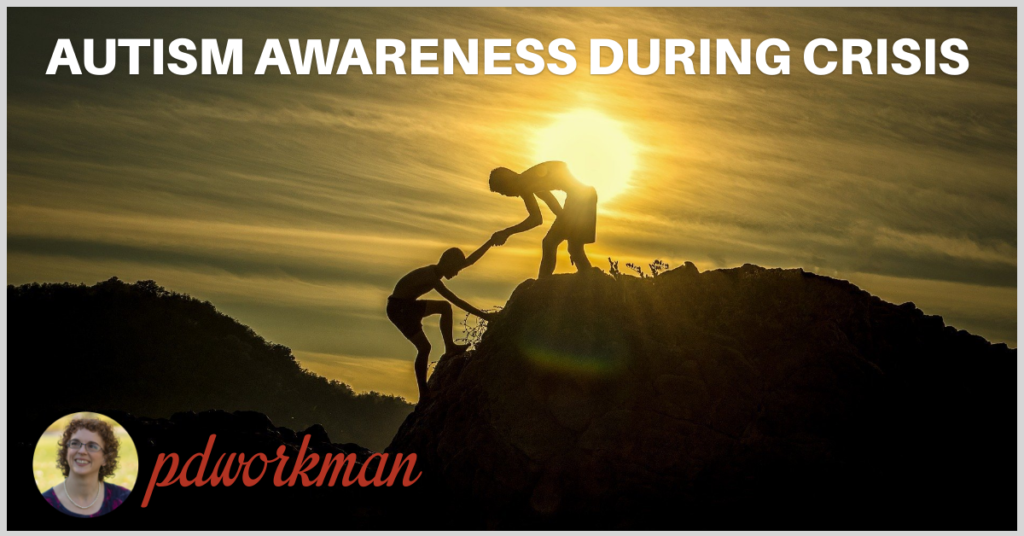
I have been pondering, in the in-between times this month, how to approach my April Autism Awareness blog this year. (See my previous posts below.) This is primarily a book blog, so I normally share fiction or non-fiction books that have an autism-positive viewpoint or are good resources for autistic people or allies.
But this year, with COVID-19 and the restrictions and extra stress that everyone is facing, it seems disingenuous to post as if there is nothing going on. Neurotypical people are suffering with isolation and navigating new situations and programs with difficulty, not to mention those who are sick or have been affected by the deaths of loved ones. It is that much more difficult for those who are disabled and/or neurodiverse, including those with autism.

Isolation inside isolation
But why would isolation be more difficult for those who are autistic? After all, don’t they prefer isolation?
No.
And even those who prefer living or working alone still suffer in this situation.
Here are a few articles explaining some of the problems autistic people are facing, including the risks of not being able to get the food they need to survive and of being triaged behind neurotypicals (and potentially not being treated) if they fall ill.
- Autism and Quarantine
- An Open Letter About COVID-19
- Shopping in the world of Coronavirus: an Autistic’s perspective

Dealing with the current situation, crisis planning for the future
I started today looking for books for autistics about preparing for and dealing with disaster. I failed to find anything useful. I moved onto looking for articles and internet resources. Most of what I could find was emergency planning for families with autistic children. There was very little aimed at helping autistic adults or their carers.
I did find this helpful article.
So, I did what I should have done in the first place and went to the autistic/neurodiverse community to see what they were finding, creating, and posting. Here I found the isolation articles above, as well as some other real treasures:
- Our Great Big List of COVID-19 Resources for Autistic People
- Why is everything so weird? Understanding life and the coronavirus
- Universal Autism COVID-19 Individual Health Action Plan
- We are Heroes A Plain Language Guide about Covid-19 and some of the changes in our lives
- Mindful Body Scan guided meditation
- Autism and Coping With Pandemic Stressors: Advice from TPGA Community Members
- Coping with a Crisis When You Have Unreliable or Intermittent Speech
If you are in need of support, contact: Portlight Inclusive Disaster Strategies, a national cross-disability disaster relief organization Hotline for people with disabilities needing help: (800) 626-4959

Medical concerns
I have also had specific concerns about autistic people knowing when they are in need of medical services and being able to access them. Autistic individuals tend to have a higher rate of a number of medical concerns than does the general population. So I went searching for some more articles and resources on that topic.
- Asperger’s, Pain Perception, and Body Awareness
- Primary Care for Adults on the Autism Spectrum
- How quiet headphones and visual guides help autistic patients get better health care
- The Mindful Body Scan above may be helpful as well
- There are a number of visual pain scales available on the net, but I would like to get more feedback from autistics as to which one(s) work best for them before recommending one

And more stress
Stress—in autistics and in neurotypicals—doesn’t look the same for everyone. We hide what we’re feeling. We don’t know what we’re feeling. We don’t know what specifically is bothering us. Or we’re just tired of being cooped up.
Some time ago, I came across this Wikihow on How to Handle an Autistic Friend’s Meltdown, which I thought was well-written and respectful. When things get to be too much, perhaps this can help you to support your autistic loved ones through difficult times.
There are other concerns that I have amidst this crisis, which also have a higher rate of occurrence in the autistic population. Homelessness is a real concern right now. People who are isolated with their abusers and no longer have a safe place to go or someone they can reach out to for help. Carers (both neurotypical and autistic) who are unable to handle the additional stress or physical demands. Please keep an eye out for the vulnerable around you. Reach out and offer help where you can.
Recommendations?
If you have some good resources, things that are helping you and your autistic family, friends, coworkers, etc. please post them in the comments section below!
And yes, books
As I said, I was not able to find books on the above topics. But I have recommended some autism-positive books in past blog posts.
Autism Acceptance Month
The International Day of the Stim
Excerpt from Neurotribes
Starting with Autism Awareness



Thank you for all of this research and information. My granddaughter is 12 now, She should have been tested before age 6 and the doctors and ins do not want to do it after age 10 when. We knew she had learning disabilities and noises were really hard for her but Mom could not be bothered with doctors for the children. Now that they are divorced and Dad has half custody of the children he saw ti she got a diagnosis. The testing doctor says severe autism but her PC says that is only because she was in a stressful situation with a stranger. I agree because I know her so well. She is very smart but because of life with Mom thinks she is too old now for the simpler books she needs to use to gain reading skills.Talk to the child and she often sounds like an adult. Maybe now we can get programs to get her up to speed. She loves technology and can do more on the computer than I can. Dad tries to limit her use of electronics but there is a learning game that he may let her use. Anyway thanks for what you have gathered.
Autistic girls are often diagnosed later than boys, as their symptoms tend to be a little different and they mask them better.
For reading, you might want to search for “hi-lo” readers. They are high interest, low readability books, which often also have additional features like wider linespacing, no words broken by hyphens, etc. This web page gives a little intro and lists some of the publishers and distributors at the bottom. You could ask them for a catalogue if they don’t have a book listing online: https://www.readingrockets.org/article/highlow-books-children
Technology can be a great incentive. My son’s interest in reading, writing, and spelling went way up when he started texting with friends on Discord and reading storylines in online games. His skills advanced very quickly at that point. But of course there are many dangers for young kids online too.
You might want to get involved in an online support group, such as a Facebook group, that includes parents and adult autistics. It can be a great help to talk to someone who has been through the same thing.
Thank you for being such a concerned, involved grandma, and most of all, for loving and accepting your granddaughter.